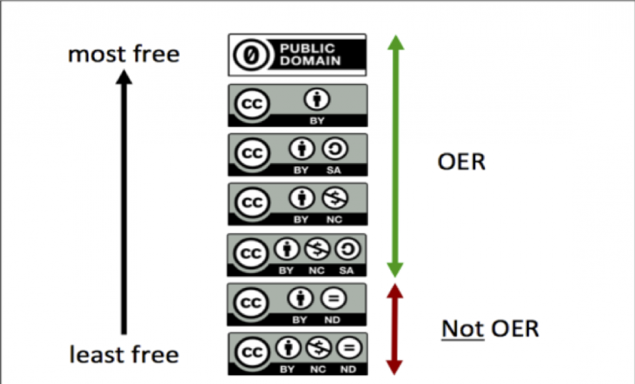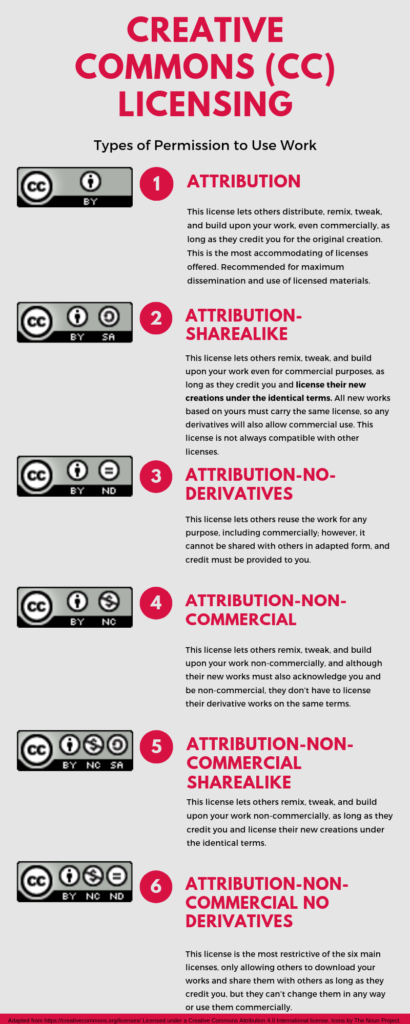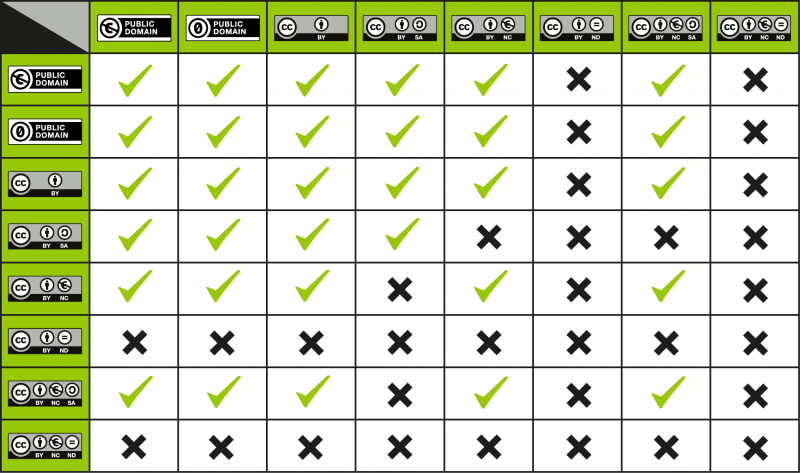Licensing
Licenses give blanket permission for named groups to use copyrightable works in limited ways, preserving all or some of the owner’s rights under copyright law. Licensing is the act of applying license terms to a work, and has legal consequences.
Conditions for licensing include:
- Only copyrightable work may be licensed.
- Works may be licensed by legitimate rights holders only.
- Once placed in the public domain, works cannot be removed and become ineligible for further claims of copyright
- Open and Creative Commons Licenses are irrevocable.
Copyright owners (rights holders) who wish to make their copyrightable work available for public use may indicate the rights of attribution, reuse, and modification they intend to share by selecting from among the restrictions listed below and either apply a Creative Commons (CC) License or provide license terms in written form, spelling out each of the rights and stipulations. Regardless of how the terms appear, read and follow the license provided. Avoid works without visible license information attached to the work.

License Terms refer to each of the rights
The rights which the owner may transmit to the public include the rights of a) attribution, b) copying and distribution, c) the right to make derivative works, and d) the right to remuneration for use. Creative commons licenses and any protections they afford do not exceed those of copyright law.
Creative Commons Licenses
Creative Commons (CC) is an international non-profit organization providing standardized licenses under copyright law, to help copyright owners efficiently communicate precisely how they intend to make their work available for public use. CC Licenses provide consistent and easy to interpret licenses, using abbreviations and graphic symbols to:
- simplify the process of making copyrightable works available for public use
- identify which rights the owner intends to share
- stipulate any conditions the owner puts upon future uses
All CC licenses except the Public Domain ( O ) designation requires attribution of the creator or owner of the work. Other restrictions limit use, are optional and may prevent reuse in unintended ways. Care is recommended in selecting license terms.
Attribution (BY)
The user must give appropriate credit to the author or owner and source and indicate the type of changes made. Attribution may be made in any reasonable manner, but not in any way that suggests the author or owner endorses you or your use. Provide a link to the source.
No Derivative Works (ND)
You may use and share the material in its entirety, but you may not distribute any derivative works.
Note: the ND restriction may make works unsuitable for adaptive OER. However ND works may be used as scholarly sources.
Non-commercial (NC)
No part of the copyrightable material may be used for any commercial purpose.
Share Alike (SA)
You may use, remix, transform or build upon the copyrightable material, but you may only distribute derivative works under the same license as the original.
Creative Commons License Types
Six CC licenses types are derived by combining the terms above. Additionally, The CC0 tool allows owners to waive all copyrights.
The Public Domain Mark may be used by institutions or others who have knowledge of a work having “fallen out” of copyright protection to mark a work as having “fallen into” the public domain.
To learn more about the designs, rationale, and structure of Creative Commons licenses, read About the licenses.

Creating or Combining Licenses

Licensed under Creative Commons Attribution-ShareAlike 3.0 Unported (http://creativecommons.org/licenses/b… ), Copyright Florida Virtual Campus.
Attribution Builder
If you are unsure how to attribute works you have used, try this attribution builder: http://www.openwa.org/open-attrib-builder/